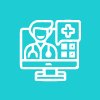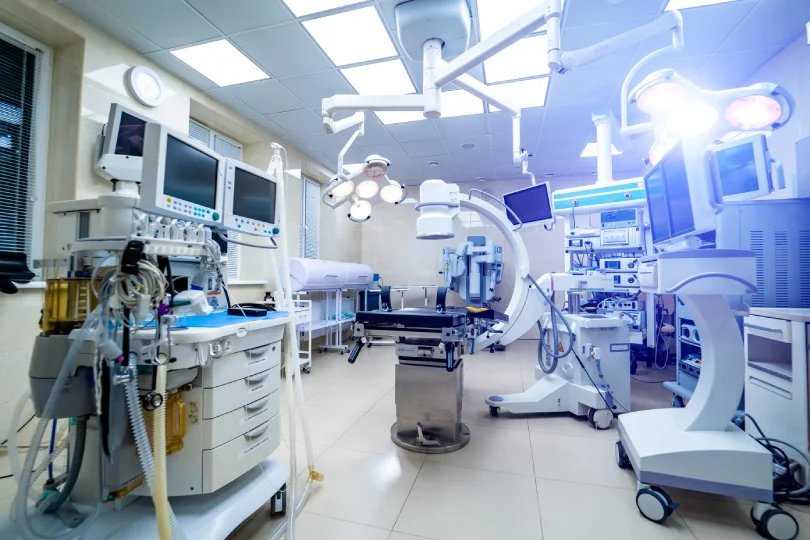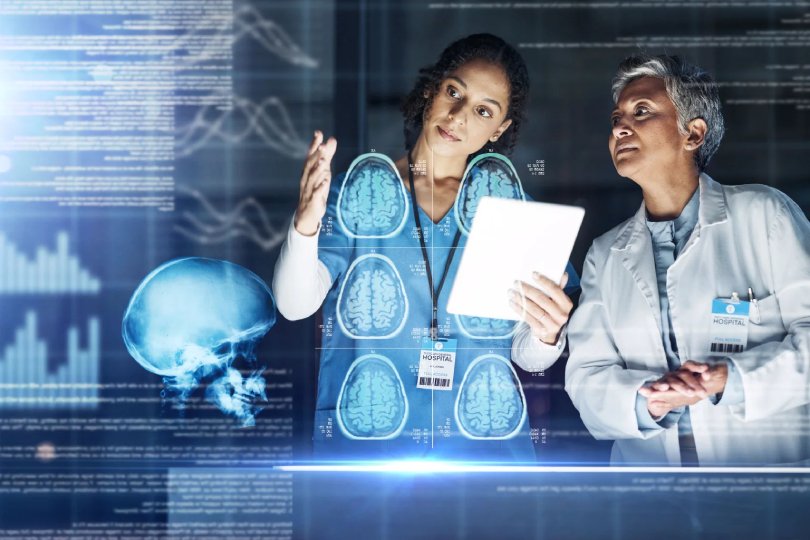WHY CHOOSE US
Why Healthgrate is the leading solution for making healthcare as efficiently operational & patient-centric as possible
Healthgrate facilitates a smart environment for hospitals, clinics, pharmacies & diagnostic centres to operate in, using state-of-the-art equipment, resources, & advanced technology, including Artificial Intelligence, Machine Learning & Data Analytics. Our efforts align with our objectives of making the existing healthcare workings, infrastructure, and services optimal for both hospitals & patients.

PROVIDING A ONE-STOP DIGITAL SOLUTION THAT
EMPOWERS DOCTORS, PATIENTS & HOSPITALS
The benefits of the Healthgrate management system are far-reaching as it offers an interactive digital interface for all the key participants of a healthcare setting, including hospitals, patients and doctors. Be it the day to day work processes of a doctor, or journey of a patient, or critical hospital functions, the app provides convenient and on-the-go access to all the respective parties.

BENEFITS FOR HOSPITALS
-
 HIMS – Hospital information management system
HIMS – Hospital information management system -
 Smart App
Smart App -
 Automated insurance/TPA desk
Automated insurance/TPA desk -
 Dedicated 24/7 call center
Dedicated 24/7 call center -
 Health Kiosk
Health Kiosk -
 Digital marketing
Digital marketing -
 Medical IOT device
Medical IOT device -
 Queue Management
Queue Management -
 Smart Resources
Smart Resources -
 Tele-ICU & radiology solutions
Tele-ICU & radiology solutions -
 Smart Pharmacy
Smart Pharmacy

BENEFITS FOR DOCTORS
-
 Smart Doctor App
Smart Doctor App -
 Digital prescription
Digital prescription -
 CPOE - Computerised Physician Order Entry
CPOE - Computerised Physician Order Entry -
 Emergency notifications
Emergency notifications -
 Clinical Research
Clinical Research -
 Doctor’s Referals
Doctor’s Referals

BENEFITS FOR PATIENTS
-
 Smart patient App
Smart patient App -
 Remote patient monitoring devices
Remote patient monitoring devices -
 Patient education/awareness
Patient education/awareness -
 Early risk predictions
Early risk predictions -
 Interactive Patient education
Interactive Patient education
Healthgrate enable operations to be streamlined to
improve efficacy & optimize costs.
WHAT WE DO
We extend cost-effective & quality-oriented smart solutions that empower the patient management system, growth prospects, operations, finances, patient satisfaction & quality of service of hospitals.

Seamless communication within hospital departments

Ease of patient registration and discharge

Improved staff management & allocation

Optimal management
of patients' health records

Remote patient monitoring for better assistance

Improved patient journey with interactive display systems
Smart Hospitals are hospitals which optimize, redesign and transform clinical processes as part of smart clinics, smart hospital management systems and the whole healthcare infrastructure, all enabled by digitization and integration of healthcare assets such as digital prescriptions and patient health cards, to provide a valuable service which was not available previously as part of conventional healthcare ecosystem. Healthgrate with the smart hospital app is facilitating a transformative shift within the healthcare space through the power of technology integration, digitization and automation. We leverage Integrated Communication Technology to create a smart environment within hospitals through Smart Health Card, wherein every process gets streamlined and optimized. Be it booking doctor consultations online to patient discharge; our interconnected smart system allows every hospital operation to become efficient.
By adopting smart solutions & technology integrations, the clinical processes of hospitals get optimized.

Better Patient Engagement
We empower hospitals to provide a better experience to patients wherein they can track their health metrics, reports, appointment status & treatment journey in real-time.

Improved Ease Of Diagnostics
Diagnosis can be made error-free, convenient and quick by streamlining complex workflows, optimising the booking processes & data transfer to specified personnel.

Workflow Optimisation
We equip hospitals with the technology & software support that optimises their workflows with tracking and review systems to increase the efficiency of the work processes.

Seamless Management
We enable hospitals to leverage interconnected systems to improve their staff allocation, inventory management, patient care & overall management.

Optimal Data Maintenance
Making maintenance of patient's health records easier and easily navigable by storing it at cloud server, which authorised individuals can readily access.

Improved Patient Journey
Real-time updates, display systems, timely notifications, ease of registration, quick consultations & more empower any patient's journey to be less cumbersome & frustrating.

Reduced Cost Burdens
Improved operational efficiency and better management of resources, staff, equipment, reputation & quality of care reduce the excessive costs incurred by hospitals.

Smooth Communications
Facilitating prompt & efficient flow of communication, information, tasks & more within the different departments of a hospital through interconnected management systems.

Real-Time Updates
We enable patients to track their entire journey within a hospital for a hassle-free experience & for the hospitals to access relevant patient information at all times for improved care.

Reduced Waiting Time
We make the registration, discharge & insurance claim process more efficient via digitization & automation so that both hospitals & patients could avoid long queues at desks.

Unified Home Care Solutions
We collaborate with doctors, clinics, and hospitals, driving enhanced home care, monitoring, nursing, and advanced medical equipment for superior diagnosis, management, and treatment at home.

O & M Services
We invest in and manage hospitals facing capital, operational, and technological challenges, enhancing their value through strategic acquisitions and effective management.
Healthgrate enable operations to be streamlined to improve efficacy & optimize costs.
FAQs
IoT in a smart hospital stands for Internet of Things and is a portable health monitoring system for the purpose of conducting rapid diagnosis with high efficiency and accuracy. It conducts a number of rapid tests and facilitates cost-efficiency in healthcare.
Improved access in the remotest of locations, greater insights & digital or automated data are key smart hospital features for improved quality of health care to all patients even in the remotest of locations via services like telemedicine.
Smart hospitals are important to society as a whole. They transform the traditional and conventional systems of healthcare delivery to completely digitized and automated ones for high patient satisfaction and retention.
Smart technology is a significant part of smart healthcare and is highly integrated and interconnected platforms empowering healthcare delivery by way of complete automation. Smart technology includes IoT devices, Hospital Information Systems and EMR as part of a smart healthcare system.
Artificial Intelligence and Machine Learning are proving to be the most beneficial health information technology for improving patient safety, security, privacy and the overall patient experience with highly integrated, digitized and efficient healthcare delivery.

Blogs

Medical equipment & technology at Healthgrate: provision towards care for hospitals & healthcare.
Medical Equipments Solutions: Medical systems at Healthgrate: providence of an interconnected, integrated holistic healthcare ecosystem with engineering & quality, ergonomics.

Healthgrate: Healthcare Information Systems, devices, solutions & tele-ICU, are among some of the devices we provide towards our vision of an integrated and highly interconnected health ecosystem.

Understanding the benefits of smart hospital
Introduction : Hospitals worldwide face 1 common problem and challenges of limited resources, tackling overcrowded surge of patients and in many cases, falling short of necessary equipment and technology.
